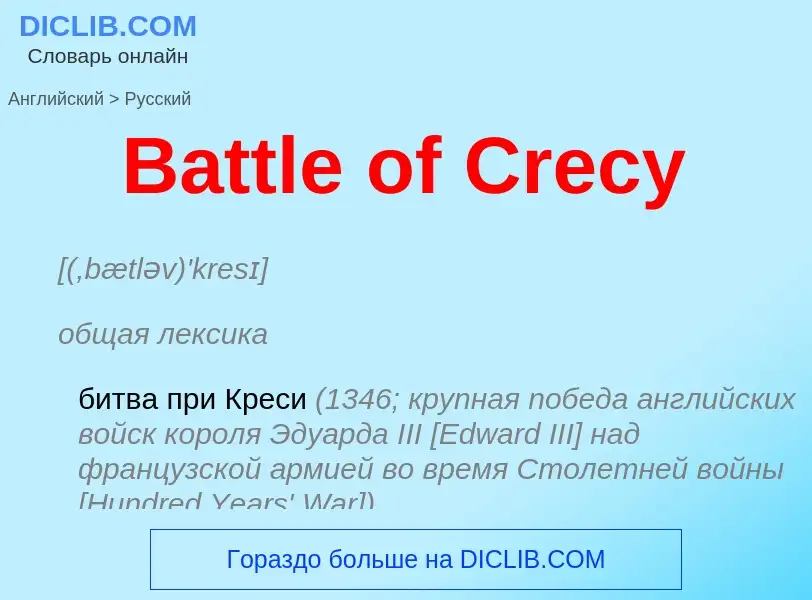Перевод и анализ слов искусственным интеллектом ChatGPT
На этой странице Вы можете получить подробный анализ слова или словосочетания, произведенный с помощью лучшей на сегодняшний день технологии искусственного интеллекта:
- как употребляется слово
- частота употребления
- используется оно чаще в устной или письменной речи
- варианты перевода слова
- примеры употребления (несколько фраз с переводом)
- этимология
Battle of Crecy - перевод на русский
[(,bætləv)'kresɪ]
общая лексика
битва при Креси (1346; крупная победа английских войск короля Эдуарда III [Edward III] над французской армией во время Столетней войны [Hundred Years' War])
по названию французского населённого пункта, в районе кот. происходила битва
[(,bætləv)'dʒʌtlənd]
общая лексика
Ютландское сражение (1916; крупнейшее морское сражение 1-й мировой войны между английским и немецким флотами; не дало решительного перевеса ни одной из сторон)
[(,bætləv)'blenɪm]
общая лексика
Battle of Blenheim
сражение при Бленхейме (1704; закончилось победой англо-австро-голландских войск под командованием принца Евгения Савойского [Eugene de Savoie-Carignon] и герцога Мальборо [Duke of Marlborough] над франко-баварскими войсками во время войны за Испанское наследство [War of the Spanish Succession])
по названию селения в Баварии, близ кот. произошло сражение
Определение
.
Википедия

The Battle of Crécy took place on 26 August 1346 in northern France between a French army commanded by King Philip VI and an English army led by King Edward III. The French attacked the English while they were traversing northern France during the Hundred Years' War, resulting in an English victory and heavy loss of life among the French.
The English army had landed in the Cotentin Peninsula on 12 July. It had burnt a path of destruction through some of the richest lands in France to within 2 miles (3 km) of Paris, sacking many towns on the way. The English then marched north, hoping to link up with an allied Flemish army which had invaded from Flanders. Hearing that the Flemish had turned back, and having temporarily outdistanced the pursuing French, Edward had his army prepare a defensive position on a hillside near Crécy-en-Ponthieu. Late on 26 August the French army, which greatly outnumbered the English, attacked.
During a brief archery duel a large force of French mercenary crossbowmen was routed by Welsh and English longbowmen. The French then launched a series of cavalry charges by their mounted knights. These were disordered by their impromptu nature, by having to force their way through the fleeing crossbowmen, by the muddy ground, by having to charge uphill, and by the pits dug by the English. The attacks were further broken up by the effective fire from the English archers, which caused heavy casualties. By the time the French charges reached the English men-at-arms, who had dismounted for the battle, they had lost much of their impetus. The ensuing hand-to-hand combat was described as "murderous, without pity, cruel, and very horrible." The French charges continued late into the night, all with the same result: fierce fighting followed by a French retreat.
The English then laid siege to the port of Calais. The battle crippled the French army's ability to relieve the siege; the town fell to the English the following year and remained under English rule for more than two centuries, until 1558. Crécy established the effectiveness of the longbow as a dominant weapon on the Western European battlefield.




, f.152v - BL Cotton MS Nero E II.jpg?width=200)
![A modern replica of a [[bodkin point]] arrowhead used by [[English longbows]] to penetrate armour}} A modern replica of a [[bodkin point]] arrowhead used by [[English longbows]] to penetrate armour}}](https://commons.wikimedia.org/wiki/Special:FilePath/Bodkin1.jpg?width=200)
.jpg?width=200)
![[[Edward III]] counting the dead on the battlefield of Crécy}} [[Edward III]] counting the dead on the battlefield of Crécy}}](https://commons.wikimedia.org/wiki/Special:FilePath/Edward III counting the dead on the battlefield of Crécy.jpg?width=200)
![bombard]] as used at the Battle of Crécy}} bombard]] as used at the Battle of Crécy}}](https://commons.wikimedia.org/wiki/Special:FilePath/English gun used at Crecy.jpg?width=200)


.jpg?width=200)

![[[Reinhard Scheer]], German fleet commander [[Reinhard Scheer]], German fleet commander](https://commons.wikimedia.org/wiki/Special:FilePath/Almirante Reinhard Scheer.jpg?width=200)
![The throat of the [[Skagerrak]], the strategic gateway to the Baltic and North Atlantic, waters off Jutland, Norway and Sweden The throat of the [[Skagerrak]], the strategic gateway to the Baltic and North Atlantic, waters off Jutland, Norway and Sweden](https://commons.wikimedia.org/wiki/Special:FilePath/Carte Skagerrak-Kattegat2.png?width=200)



 Jutland.jpg?width=200)
![6}}, the last surviving warship that saw action at Jutland, is preserved in [[Belfast]], [[Northern Ireland]] 6}}, the last surviving warship that saw action at Jutland, is preserved in [[Belfast]], [[Northern Ireland]]](https://commons.wikimedia.org/wiki/Special:FilePath/HMS Caroline 1914.jpg?width=200)

![Beatty's]] flagship HMS ''Lion'' burning after being hit by a salvo from SMS ''Lützow'' Beatty's]] flagship HMS ''Lion'' burning after being hit by a salvo from SMS ''Lützow''](https://commons.wikimedia.org/wiki/Special:FilePath/HMS Lion (1910).jpg?width=200)


![John Jellicoe]], British fleet commander John Jellicoe]], British fleet commander](https://commons.wikimedia.org/wiki/Special:FilePath/John Jellicoe, Admiral of the Fleet.jpg?width=200)




![David Beatty]], commander of the British battlecruiser fleet David Beatty]], commander of the British battlecruiser fleet](https://commons.wikimedia.org/wiki/Special:FilePath/Vice Admiral Sir David Beatty.jpg?width=200)
![Franz Hipper]], commander of the German battlecruiser squadron Franz Hipper]], commander of the German battlecruiser squadron](https://commons.wikimedia.org/wiki/Special:FilePath/Vizeadmiral Hipper, der Befehlshaber der deutschen Aufklärungsschiffe in der Seeschlacht.png?width=200)



![The Battle of Blenheim by [[Huchtenburg]] The Battle of Blenheim by [[Huchtenburg]]](https://commons.wikimedia.org/wiki/Special:FilePath/Copy after Jan van Huchtenburgh (Haarlem 1647-Amsterdam 1733) - The Battle of Blenheim (or Höchstädt), 1704. - RCIN 404899 - Royal Collection.jpg?width=200)
![[[Henry de Nassau, Lord Overkirk]] took control of Allied forces in the Netherlands [[Henry de Nassau, Lord Overkirk]] took control of Allied forces in the Netherlands](https://commons.wikimedia.org/wiki/Special:FilePath/Hendrik van Nassau-Ouwerkerk.jpg?width=200)
![Portrait of the Duke of Marlborough by [[Adriaen van der Werff]] (December 1704) [[Uffizi]] Portrait of the Duke of Marlborough by [[Adriaen van der Werff]] (December 1704) [[Uffizi]]](https://commons.wikimedia.org/wiki/Special:FilePath/John Churchill Marlborough porträtterad av Adriaen van der Werff (1659-1722).jpg?width=200)
![Marlborough and Cadogan at the Battle of Blenheim by [[Pieter van Bloemen]] Marlborough and Cadogan at the Battle of Blenheim by [[Pieter van Bloemen]]](https://commons.wikimedia.org/wiki/Special:FilePath/Pieter van Bloemen - The Duke of Marlborough and the Earl of Cadogan at Blenheim (Hochstadt).jpg?width=200)
